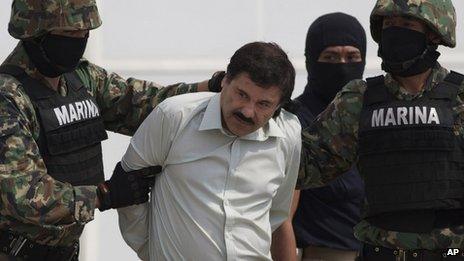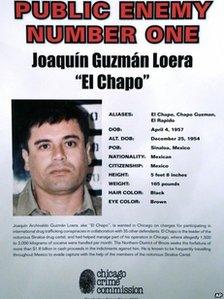Will arrest of 'El Chapo' Guzman curb Chicago drugs?
- Published

Guzman's Sinaloa cartel supplies as much as 70% of the drugs sold in the streets of Chicago, the DEA said
Last Saturday's capture of Mexican drug lord Joaquin "El Chapo" Guzman in a Mexican beach town was followed with particular interest in Chicago, more than 2,000 miles (3,219km) away. Even as they celebrate his arrest and await his possible extradition to the US, law enforcement officials question whether it will stem the tide of drugs flooding the city's streets.
In 2013, the Chicago Crime Commission (CCC) named Guzman the city's Public Enemy Number One, a title previously given only to mob boss Al Capone.
And now, though Guzman is behind bars, the CCC has no plans to strip that label from the man the US treasury department once called the world's most powerful drug trafficker.
"We don't know what his power potential is while he is in custody," the group's executive vice-president Art Bilek said.
'Dominant' criminal organisation
The Sinaloa cartel is one of the most dominant international drug trafficking organisations active in the US, according to the US justice department's 2011 National Drug Threat Assessment, which noted its "sophisticated, well-developed transportation and distribution networks".
Chicago, long a hub of transportation of cattle, grain and other legitimate goods, is also one of the top destinations for heroin, marijuana, cocaine and methamphetamine, the DEA says.
And Guzman's Sinaloa cartel is at the centre of that, supplying as much 70% of the illegal drugs sold and used in Chicago's streets, the DEA says.
"Chicago is a major trans-shipment point," says Peter Bensinger, former DEA administrator under Presidents Gerald Ford, Jimmy Carter and Ronald Reagan.
"Guzman's drugs reached all over, but Chicago and the highway up to the Mid-west to Chicago was his main distribution channel. The bulk of his trafficking began here."
And Chicago's many street gangs serve as a retail distribution network for the Sinaloa cartel's drugs, to the extent that the authorities say the cartel's activities are a key factor in the city's gun violence epidemic.
Authorities are well aware of the Sinaloa cartel's presence in the state of Illinois, in which Chicago is the largest city. They have focused in recent years on disrupting Guzman's businesses as much as possible.
Guzman's designation as Public Enemy Number One by the CCC, a non-governmental organisation, "helped to raise awareness both nationally and internationally", says Mr Bensinger.
Morale booster
In addition, Guzman was formally indicted in a Chicago federal court in August 2009 alongside 35 other suspects.
"These are the most significant drug importation conspiracies ever charged in Chicago," the US attorney in Chicago, Patrick Fitzgerald, said at the time.
"The defendants allegedly used practically every means of transportation imaginable to move these large amounts of drugs and to funnel massive amounts of money back to Mexico."
Law enforcement agents have also been closing the net around some of his alleged associates.
One of them, Vicente Zambada-Niebla, was captured in Mexico and extradited to the US.
And two others, Pedro and Margarito Flores, who have been accused of distributing Guzman's drugs in Chicago, were placed in federal custody and reportedly began co-operating with the authorities.
According to the 2009 indictment, the brothers' distribution cell received, on average, 1,500-2,000kg (3,307-4,409lb) of cocaine per month.
Now that the cartel's leader himself is behind bars, many in law enforcement are asking how that could affect Chicago.
Mr Bensinger believes that, as a starting point, last Saturday's capture of Guzman will boost law enforcement agents' morale.
"It means people they thought couldn't be touched can be touched," he says.
Supply and demand

Moreover, he argues that with Guzman in custody, some of the links between the Sinaloa cartel and the street gangs in Chicago might be severed, especially if the agents who caught him also seized intelligence about the transit routes.
"There are extra benefits when you capture someone like him," he says. "When you cut off the head, you also get other parts. Those parts are the arms of his trafficking organisation.
"After last weekend, I think it will be possible to more effectively identify those street gangs in Chicago."
But Art Bilek of the Chicago Crime Commission disagrees and fears Chicago will not benefit from the capture.
"The same amount of narcotics will be shipped up there whether it is by the Sinaloa cartel or the Zetas," he says, referring to another murderous Mexican drug cartel.
"As long as there are people who want to buy a can of beans, the companies that make beans will send them to Chicago and put them on the grocery shelves," he says.
"It is as simple as that."
- Published26 February 2014
- Published22 February 2014
- Published22 February 2014
- Published1 January 2012